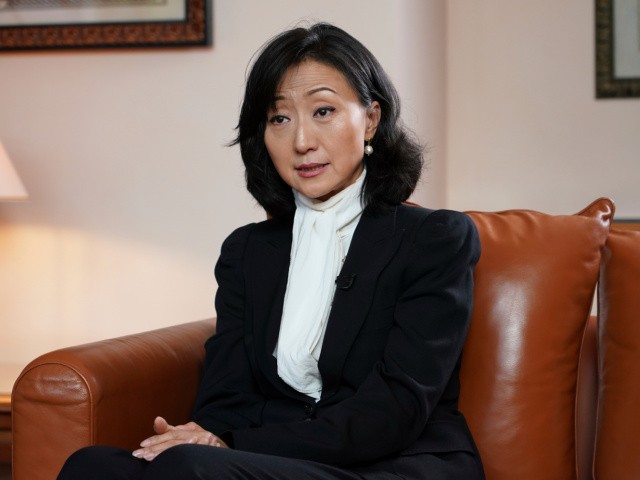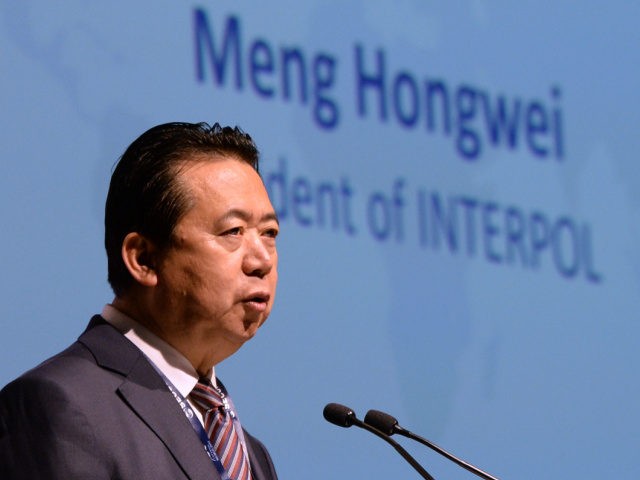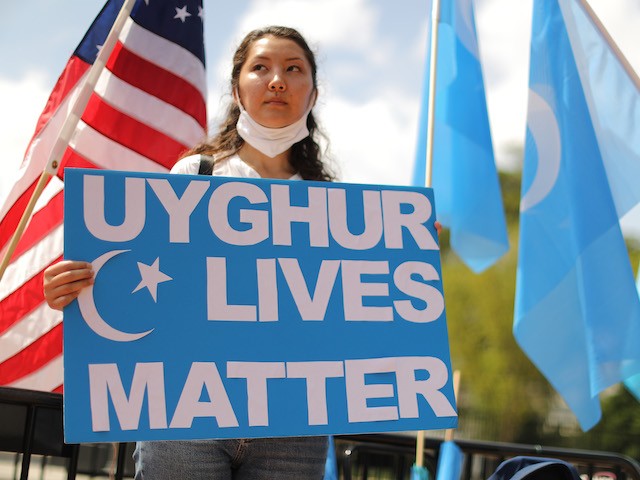The Communist Party of China celebrated a victory Friday against “slander and malicious obstruction from some so-called ‘human rights’ activists” with the election of Chinese official Hu Binchen to Interpol’s executive committee.
Hu’s ascent in the organization indicates that Interpol will continue to cooperate with the Communist Party despite the fact that it abducted and disappeared a former president of Interpol, Meng Hongwei, in 2018. Meng’s wife, Grace, denounced his disappearance in September of that year after a visit to China to see family. Meng’s last text to his wife, she said, was an ominous knife emoji. He resurfaced in late 2019 under police custody and was accused of taking more than $2 million in bribes while a senior security official with the Communist Party. Grace Meng said in an interview with the Associated Press last week that she has no information regarding her husband and does not know if he is still alive.

Grace Meng, the wife of former Interpol president Meng Hongwei, answers the Associated Press in Lyon, central France, Tuesday, Nov.16, 2021 (AP Photo/Laurent Cipriani).
Under Meng, Interpol had rejected pressure from Beijing to use its security apparatus to harass human rights activists, most notably the president of the World Uyghur Congress, Dolkun Isa.
Chinese government-run propaganda newspaper Global Times applauded Interpol on Friday for appointing Hu to its executive committee, which helps its president and secretary-general direct global law enforcement activities. While Interpol does not have the authority to detain suspects or otherwise engage in traditional police activity, it functions as a platform to help countries coordinate law enforcement activities. Through its color notice system, Interpol alerts member countries to fugitives or persons of interest in various crimes. The system has faced extensive pressure from authoritarian regimes, most prominently China and Turkey, to issue frivolous red notices against individuals these governments simply deem inconvenient.
“During the past week, several so-called ‘human rights’ activists and politicians hyped the election, attacking China’s nominee, with some even attempting to obstruct Hu’s election,” the Global Times asserted. “They also used the election to make groundless accusations against China’s ‘Operation Fox Hunt’ anti-corruption campaign, which was carried out by the MPS [Ministry of Public Security].”
“Operation Fox Hunt” is the communist purge of inconvenient officials, all accused of various charges of bribery and other corruption, which ultimately resulted in Meng’s disappearance.
Hu Binchen served as deputy director general of the MPS’s international coordination department before joining Interpol, the outlet noted. The MPS is the government agency charged most directly with repressing political dissidents, religious groups, and ethnic minorities.
The alleged attempts to obstruct Hu that Chinese state media objected to were largely in response to mounting evidence that China has abused the red notice system to attempt to repatriate and disappear political dissidents. Speaking to the South China Morning Post, activists lamented on Thursday that such a high-ranking member of the repressive Communist Party would receive such outsized influence at what, in theory, should be an organization that helps uphold the law.
“Hu’s election gives the [Chinese] government a green light to continue using Interpol as a vehicle for its repressive policies globally,” the Inter-Parliamentary Alliance on China (IPAC) asserted in an open letter, “and places thousands of Hongkonger, Uygur, Tibetan, Taiwanese and Chinese dissidents living abroad at even graver risk.”
China is currently engaging in genocide against the Uyghur people of East Turkistan, an occupied region China refers to as Xinjiang. Satellite images and other evidence show China has built hundreds of concentration camps in East Turkistan for local Muslim people. Survivors say the camps are used to indoctrinate, torture, sterilize, rape, and enslave Uyghurs. Multiple world governments, including that of American President Joe Biden, have ruled China’s actions in East Turkistan a genocide.
Interpol expert Edward Lemon told Radio Free Europe/Radio Liberty (RFE/RL) last week that appointing Hu – and now-President Major General Ahmed Naser al-Raisi of the United Arab Emirates (UAE), who stands accused of human rights abuses – would “send a signal to other authoritarian governments that it is OK to abuse Interpol.”
“They are likely to work with like-minded governments to stymie reform efforts pushing for greater transparency in Interpol and accountability for governments using the organization to pursue opponents,” Lemon warned.
Isa, the president of the World Uyghur Congress, whom China has tried to use Interpol to silence, also expressed alarm last week at the possibility of Hu becoming a member of the executive committee.
“For many years, I have personally experienced the consequences of China’s abuse and repressive influence at international institutions,” Isa said in a statement, adding: “Until 2018, China’s INTERPOL Red Notice against me posed a particular threat and barrier to my work to defend and promote Uyghur rights and freedoms. The international community cannot allow China’s attempts to influence and abuse multilateral institutions like INTERPOL to continue unchecked.”
In response to the growing international discontent that Hu was a candidate for the executive committee last week, the Chinese Foreign Ministry dismissed all concerns as the product of untoward “politics” rather than human rights concerns.
“Interpol is a professional organization focused on cracking down on cross border crimes. It should be free from the disruption of politics and other factors,” spokesman Zhao Lijian told reporters. “By recommending appropriate candidates to run for the executive committee membership, China, an Interpol member, is taking concrete steps to support the organization’s goal of fighting terrorism and cross border crimes to make the world a safer place.”
Last week, Grace Meng, in her first interview after her husband’s disappearance in which she allowed herself to be photographed clearly, told the Associated Press that Hu may ultimately become a victim of Chinese communist repression just as her husband did. She noted that the Mengs knew Hu “extremely well,” as he was Meng’s underling at the Ministry of Public Security before he left to Interpol.
“At the moment, China is, for lack of a better phrase, eradicating the ‘pernicious influence’ of Mr. Meng Hongwei, carrying out a political purge,” she said. “So if Mr. Hu Binchen sympathizes with us or helps us, or expresses kindness toward us, that will mean that he will be violating party discipline. If he respects party discipline, he’ll be going against basic human goodness. So this is a problem.”
“One day, will Mr. Hu Binchen also be disappeared, like Mr. Meng?” she asked.


COMMENTS
Please let us know if you're having issues with commenting.